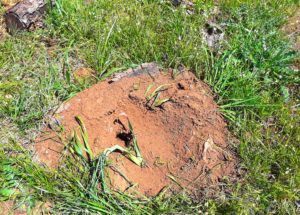Northwest Georgia is notorious for several things, including large fire ant hills and thick, sticky red clay. The clay is so thick, it is hard to imagine any plant can grow in it without a lot of compost or some other organic material to break it up. However, the fire ants make their hills in this clay. They somehow mill it up so it comes out as small particles of dirt.
SO, the basis for my gardening experiment. What if I planted a large, tough existing plant (in this case, an iris root with two large leaves) on the edge of the fireant hill? Would the ants eat it? Would they simply continue to build around the iris? Would the root, leaves and flowers thrive because of the good, permiable soil conditions provided by the ants? I would not expect seeds to grow well, as they would probably be carried away by the ants, BUT something like an iris, with a large root?
Taking great care to dig into the fire ant mound on a cold, rainy day (the ants were deep in the mound and, being insects, not moving very fast in the cold), I shoveled a deep hole on the edge of the mound, threw the iris in, covered the root and about 2 inches of the leaves with soil from the mound (making certain to use my shovel so I didn’t get bit!), then moved quickly away, dragging my shovel through long wet clover, to wipe off any ants.
Now we’ll wait and see what happens!
